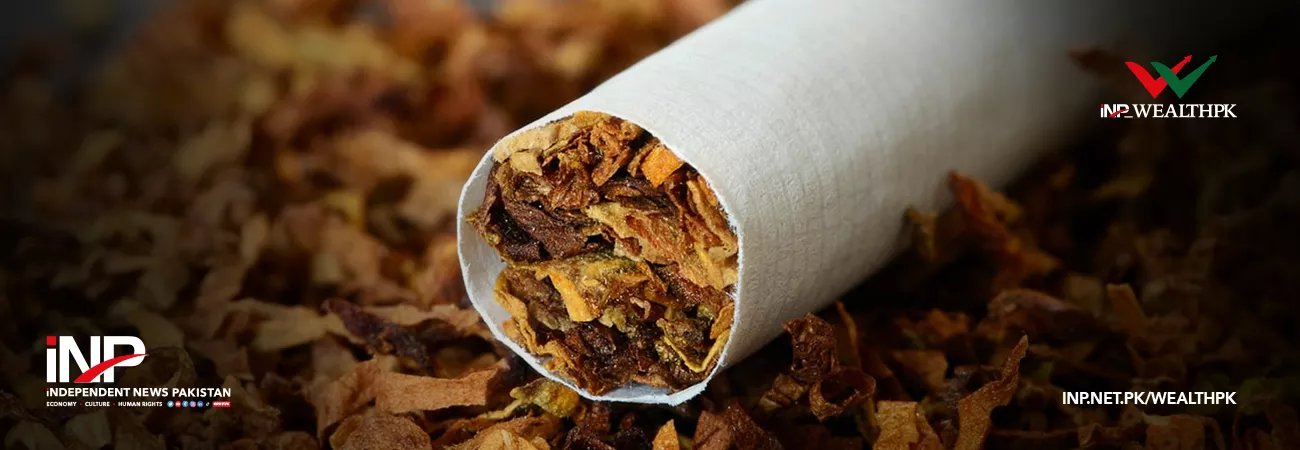INP-WealthPk
Arsalan Ali
The government of Pakistan needs to take effective steps to minimise the negative effects of tobacco cultivation on the environment, water resources and human health, WealthPK reports. The cultivation and disposal of tobacco have detrimental effects on the environment, people’s health and water resources. The tobacco industry is also hindering the achievement of sustainable development goals (SDGs) set by the United Nations.
Waseem Iftikhar, a senior researcher at the National University of Sciences and Technology Institute of Peace and Conflict Studies (NIPCONS), told WealthPK that 8.7 million people around the world died of tobacco use each year. He added that eight out of 10 deaths in developing countries were related to tobacco consumption. He said that 3.7 liters of water were used in preparation for a single cigarette that emitted 14 gallons of carbon dioxide and 3.5 gallons of fossil fuels.
He added that globally, 32.4 million tonnes (MT) of tobacco crop and 6.48 MT of dry tobacco emitted 84 MT of carbon dioxide. Waseem Iftikhar said that 27 billion metric cubes of water were depleted for preparing cigarettes and 21 MT of fossil fuels used for heating and curing different tobacco products. He added that around 4.5 trillion cigarettes are produced worldwide every year, polluting oceans, lakes and other green areas on the planet.
He said that the production of tobacco has a direct impact on people’s health. “Indirectly, the process of growing, curing, producing, transporting, smoking and disposing tobacco has a harmful effect on our environment,” he added. Due to the production of tobacco-related products in Pakistan, marine pollution and waste management cost more than Rs27 billion and tobacco is a monocrop since the land used in its production cannot be used for the cultivation of other crops.
Its production requires pesticides and fertilisers that damage the land and affect its fertility. More than 45 billion cigarettes are produced annually in Pakistan, causing the death of 163,672 persons per year and inflicting a loss of Rs615 billion on the national exchequer. The tobacco industry only pays taxes of around Rs90 billion. The use of tobacco has an impact on SDGs involving poverty reduction, people’s health and wellbeing, and inequality mitigation in the country.
Poor people in low and middle-income countries face the brunt of tobacco use as they have to spend more on health. The SDGs 2030 goals are meant to reduce one-third of premature mortality caused by non-communicable diseases through prevention and treatment and promote mental health and wellbeing, but in the presence of tobacco use, the goals seem difficult to be achieved. The use of innovative electronic products has been increasing among youth, who form more than 60% of the total population.
The use of nicotine pouches, e-cigarettes and heated tobacco devices takes a toll on youth as they get addicted to them. Waseem Iftikhar said that large multinational tobacco companies in western developed countries shifted their products to low and middle-income countries when their products were banned in their own countries. “The tobacco industry must be held accountable but more emphasis is laid on taxes in our country.
The taxes paid by tobacco firms are insignificant as compared to the damage they are causing,” he said. He said that the government needed to devise a long-term multisectoral tobacco taxation policy in consultation with all stakeholders as taxes on the tobacco industry has not been increased since 2019. He said promotion of tobacco brands should be prohibited and agricultural support must be extended to farmers. “There is a need to foster international cooperation for tobacco control. Pakistan needs to work on chalking out tobacco laws on the pattern of other countries around the globe,” Waseem Iftikhar told WealthPK.
Credit : Independent News Pakistan-WealthPk




